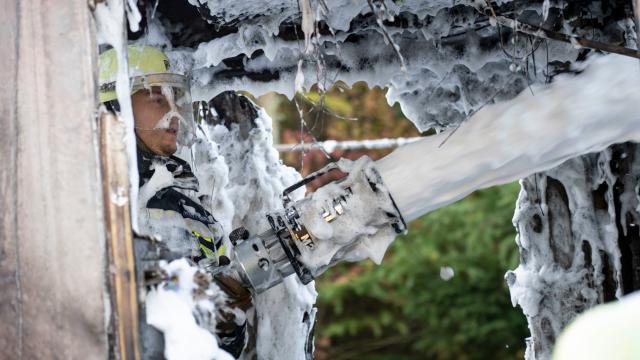New research shows an incinerator licensed to dispose of toxic firefighting foam is instead belching out dangerous chemicals onto neighbouring communities, including a public housing project.
The Norlite incinerator is one of four plants across the country that has a contract with the U.S. Department of Defence to dispose of the foam known as AFFF. But apparently it’s not doing such a great job. A group of students and faculty at Bennington College tested water and soil samples from the area surrounding the facility, and sent them to a lab for analysis. The preliminary results suggest that incinerating the foam isn’t breaking down those chemicals.
“Far from destroying AFFF, the Norlite facility seems to be raining down a witches brew of polyfluoronated compounds on the poor and working class neighbourhoods in Cohoes, New York,” David Bond, an anthropology and environmental studies professor at Bennington who led the research, said on a press call.
[referenced url=” thumb=” title=” excerpt=”]
The results reflect the lack of an environmental review process, specifically that the Department of Defence didn’t identify the temperatures needed to destroy PFAS or make sure that the incinerators could reach those temperatures to dispose of material that’s resistant to flames.
The researchers found higher levels of PFAS compounds in the neighbourhoods closest to the incinerator, including a public housing project at the foot of the facility where 70 families live. They also found more of PFAS compounds downwind of the facility than upwind, suggesting that the chemicals are being lofted airborne. The team is now calling for more extensive water, soil, and human testing to determine how the PFAS is being dispersed and what health impacts locals may be experiencing.
In February, the researchers learned from public information requests that New York’s Department of Environmental Conservation has known that Norlite was burning AFFF foam since 2018, which contains over 250 different PFAS compounds. But the facility didn’t disclose that information to the public or conduct sufficient testing to determine if the process would be safe for nearby residents.
Exposure to even trace amounts of PFAS chemicals has been strongly linked to cancer, delayed learning abilities in infants and children, and increased cholesterol levels. New research also shows exposure to PFAS may increase chances of miscarriage.
New York’s Department of Environmental Conservation has said the plant has suspended the incineration of AFFF, but that it’ll start burning it again in May or June. Local lawmakers are trying to stop that: this week, the Cohoes council will vote on a measure that will force them to make that moratorium last for a year. Meanwhile, the researchers are pushing for a permanent statewide ban on incinerating PFAS, and are awaiting the results of a lawsuit against the Department of Defence over their contracts with incinerators.
“Does anyone really think spewing toxic chemicals into poor and working-class neighbourhoods is a scientifically sound solution to the dangers of perfluorinated compounds? Incineration of AFFF must stop now,” Bond said.
